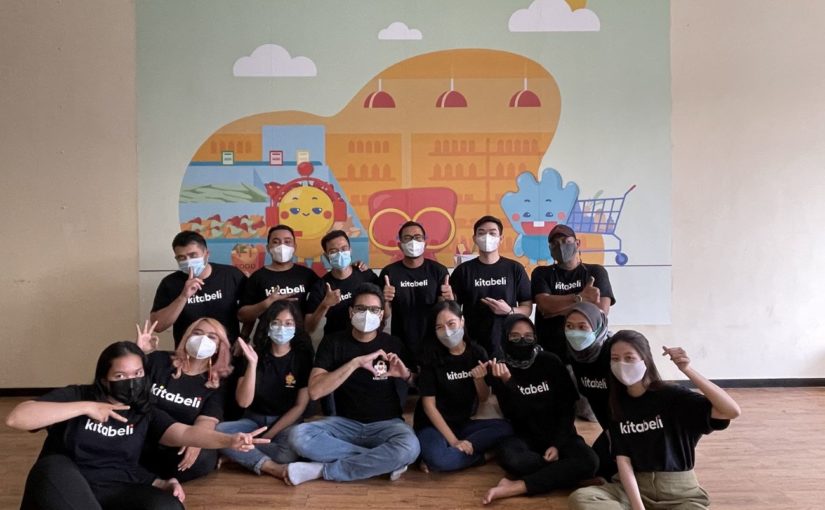An FMCG-specific social commerce startup, KitaBeli, announced a $20 million (worth 299.5 billion Rupiah) funding round led by Glade Brook Capital Partners, an American equity investment firm. KitaBeli’s previous investors, AC Ventures, and Go-Ventures also participated, along with a new investor, Innoven Capital.
KitaBeli is to use the fresh money to continue expanding into second and third-tier cities across the country, while launching new product categories such as beauty, personal care, mother & baby products, and frozen foods.
KitaBeli is a social commerce platform that offers FMCG products and allows users and partners to get discounts and earn money by leveraging their social network. This app allows consumers to enjoy discounted prices through a social and gamified shopping experience.
Unlike most e-commerce applications, KitaBeli runs a direct-to-consumer business model that offers buyers the basic necessities of daily life. KitaBeli combines PinDuoDuo’s ‘group buying’ approach and combines it with a local community approach.
“By being extremely consumer-focused, we have been able to achieve product-market fit and scale very fast in a historically untapped market,” explained Prateek Chaturvedi, co-founder and CEO of KitaBeli, Monday (18/7).
He continued, by leveraging the offline social networks of our Local Community Leaders (Mitras), we have been able to reach thousands of new users who are buying online for the first time in their lives. This has helped us build massive loyalty with our customers and enabled us to deliver better long-term margins than other players.”
“Glade Brook is one of the most experienced growth stage investors we’ve met, and their experience in e-commerce and social commerce across emerging markets globally is unmatched. The experience and insight that Linda Guo, Paul Hudson and their entire team have brought to this space convinced us that they are the right partners on our journey.” he said.
Glade Brook Capital Partners’ Partner, Linda Guo said, “We are excited to partner with KitaBeli to bring better, more affordable ecommerce access to second-tier communities in Indonesia. We believe the next wave of ecommerce growth in Indonesia will be driven by consumer demand outside major cities like Jakarta.”
AC Ventures Founder & Managing Partner Adrian Li added, the company’s commitment to KitaBeli further substantiates our thesis that Indonesia’s next frontier of ecommerce users will come from second- and third-tier cities in Indonesia. KitaBeli has focused on creating a solution that is well-suited for rural consumers. It utilizes social hooks and gamification to push engagement and employs a hyper-local community delivery model.
“KitaBeli’s product-led approach and operational excellence has demonstrated powerful customer engagement, strong top-line growth, and promising take rate expansion. We are enthusiastic about KitaBeli’s future and excited to have been a part of the journey from the very beginning,” Adrian said.
Opportunities in the second and third tier cities
Chaturvedi said that historically, expansion into rural areas has not been widely implemented by other players. Whereas second and third-tier cities in Indonesia currently represent a market of more than $100 billion, with over 200 million consumers and contributions exceeding 50% of the country’s GDP. However, this opportunity is not immune to the following issues.
For example, consumers often experience longer delivery times for online shopping orders. KitaBeli provides solutions by building warehouses in its operational areas, enabling it to make same-day and next-day deliveries straight to the customer.
Furthermore, consumers are often hitched with higher prices due to broken supply chains. This often results in 10%-50% cost higher than consumers living in Jakarta. By sourcing products directly from brands and principals, KitaBeli provides huge savings to consumers.
“Also, consumers in second-and third-tier cities often have trust issues with e-commerce as they don’t familiar with the person they doing business with. In order to solve the trust issues, KitaBeli employs a different strategy from its competitors, focusing on consumers’ offline networks and encouraging them to invite friends and family to use the platform.”
Over the past few months, KitaBeli claims to have grown more than 10 times and this achievement makes the company a leading player in this vertical in Indonesia.
—
Download the recent Social Commerce report published by DailySocial.id here. Discussing the trend and business model of Indonesian Social Commerce.
